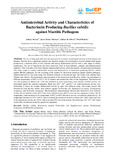Antimicrobial Activity and Characteristics of Bacteriocin Producing Bacillus subtilis against Mastitis Pathogens

View/
Date
2021Author
Maina, Juliana
Mathara, Julius Maina
Kikuvi, Gideon M
Wafula, Eliud
Metadata
Show full item recordAbstract
The use of drugs and antibiotics has increased the resistance of pathogenic bacteria in both animals and
humans. This has been a significant problem and therefore triggers the investigation of novel antimicrobial agents
produced by a bacterial strain of low virulence and having antimicrobial activity with a wide range of clinical
significance. The use of bacteriocin has been extensively used in food industries, animals, and pharmaceutical
industries. This is because it has been linked to antimicrobial activity, which has specific self-protection mechanisms.
This study sought to evaluate antimicrobial activity and characteristics of bacteriocin producing Bacillus subtilis
against Mastitis pathogens. For the screening of the isolates for bacteriocin properties against mastitis pathogens,
antimicrobial activity was done using well diffusion methods on the nutrient agar. The results were obtained after
24hours and 48hours. Physiochemical characterization of the bacteriocin from Bacillus subtilis was determined at
different temperatures of 60°C to 121°C for 15 minutes and monitor the effect of the temperature. The bacteriocin
was also prepared at different pH (3-9) and incubated at room temperature; each sample's residual activity was
determined against the indicator organisms. Metal ions (Cu2+, Zn2+, and Fe2+) on crude bacteriocin activity were
determined to assess the residual antimicrobial activity by agar well diffusion assay. The results showed that
bacteriocins from Bacillus subtilis were effective against Escherichia coli, Staphylococcus aureus, Pseudomonas
aeruginosa and Klebsiella pneumonia. Physiochemical characterization showed that bacteriocin from different
isolates had no inhibition from pH 3-5 and varied inhibition from pH 6-9 across the test organisms' isolates. On the
temperature, crude bacteriocins at a temperature of 50°C to 60°C showed no activity loss based on initial activity. As
temperature increases to 70°C to 80°C, there is reduced the bacteriocin activity of about 20%. 100°C had a 40% loss
of the bacteriocin activity and 121°C with more than 50% loss of the activity. On metal ions, Cu2+, Fe2+, Zn2+ had a
varied effect on bacteriocin activity against test organisms
